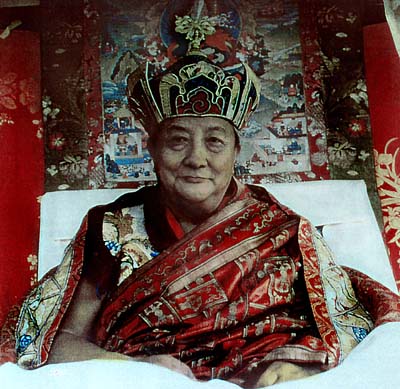
Kyabjé Dilgo Khyentsé Rinpoche
wearing the Ögyen Pèd-zha
Kyabjé Dilgo Khyentsé Rinpoche wears the Ögyen Pèd-zha – the ‘Lotus Crown of Padmakara’. The Ögyen Pèd-zha is worn by all lineage holders of the Nyingma Tradition.
Khandro Déchen says of
the Crown of Ögyen:
The Ögyen Pèd-zha symbolises the
lotus-born quality of the enlightened state – which arises
‘self-manifested’. Just as a lotus arises from mire—and shows no
signs of the mire on its pristine petals—so too does the non-dual state arise
from the illusory mire of duality.
Dilgo Khyentsé Rinpoche usually appeared in simple dress, and he is remembered for his enlightened simplicity in every aspect of his presence – apart from the complexity and vastness of his knowledge. Like all Lamas , Kyabjé Dilgo Khyentsé Rinpoche stressed the importance of the vajra master, devotion to the Tsawa’i Lama, and the practice of Lama’i Naljor.
Ngak’chang Rinpoche has stressed the importance of the vajra master in his teachings since 1976 when he first responded to interest in Vajrayana in the West. One of the first impressions he gained of Western interest in Vajrayana was that the sense of the fundamental centrality of the vajra master was lacking. With the inspiration of Kyabjé Dilgo Khyentsé Rinpoche, Kyabjé Düd’jom Rinpoche, Kyabjé Künzang Dorje Rinpoche and Jomo Sam’phel, and his other Tsawa’i Lamas (as well as every other Vajrayana master with whom he has studied and taken transmission) he, along with Khandro Déchen, has worked strenuously to establish a sense of the fact that without the vajra master there is no Vajrayana.
Ngak’chang Rinpoche
says of Kyabjé Dilgo Khyentsé Rinpoche:
One of the saddest
points of recognition for me is that it was not possible for me to see Rinpoche more
often. I feel utterly fortunate to have received many transmissions from him –
especially the transmission of the gTértön Sonam Gyaltsen’s Dorje
Phurba. During the early 1970s Kyabjé Dilgo Khyentsé Rinpoche
encouraged me in my study of Dorje Phurba and conferred various teachings which
related to several lineages that he held. One of the greatest treasures is the ivory
phurba that Kyabjé Dilgo Khyentsé Rinpoche gave me as an inspiration to
be carried into retreat.
My meetings with him were a profound
influence on me in terms of his sheer brilliance and luminescence – but what
stayed with me always has been his emphasis on kindness and his utter rejection of
all dharma politics. But more than this was his love of his own vajra master.
Kyabjé Dilgo Khyentsé Rinpoche’s utter uncompromising devotion
for his Tsawa’i Lama illuminated everything he said and everything he did. This
was the inspiration he imparted to everyone who came to him, and in many ways was the
greatest teaching I received from him.
Kyabjé Dilgo
Khyentsé Rinpoche always stressed the primacy of the relationship with
one’s vajra master – and told his students repeatedly that realisation
was not possible through the Sutrayana without reverence and trust in the Spiritual
Friend – or, in Vajrayana, without devotion and utter reliance on the Lama.
This is the most important message Khandro Déchen and I have for Western
people. It is the message of Kyabjé Dilgo Khyentsé Rinpoche, every
Dzogchen master, and every Lama of every school of Tibetan Buddhism.
